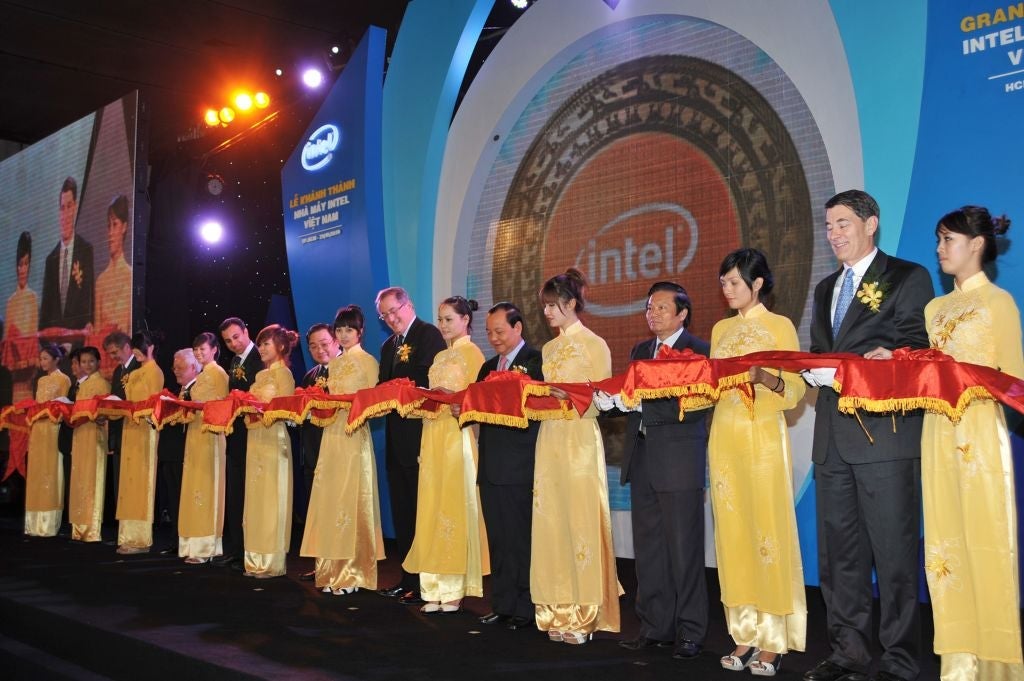

The Biden administration has so far shown little sign of seeking détente with China. The new president has echoed his predecessor’s concerns that China’s growing role in high-tech sectors represents a security threat to the US and its allies.
Under Donald Trump, the US led a global effort to exclude China’s technology sector from sensitive international markets.
Most notably, the Trump administration argued that the involvement of Chinese company Huawei in allies’ 5G infrastructure represented a security threat, alleging close ties between the company and the Chinese government.
Although few countries followed Trump’s advice to exclude Chinese company Huawei from their 5G networks, the Biden administration seems likely to continue a policy of technological decoupling. If Joe Biden does decide to continue with Trump’s tech war, he could force China out of global tech markets.
US tech companies demonstrate a global reach
Analysis by Investment Monitor shows the extent of US leverage in the global market for tech investment. The US is the dominant superpower tech investor in 131 countries, as measured by the distribution of subsidiaries of leading companies.
The Monitor Network’s multinational companies database tracks global subsidiaries of 2,190 of the world’s largest companies by revenue. Included in the count for the study are tech, communications and electronics companies.
How well do you really know your competitors?
Access the most comprehensive Company Profiles on the market, powered by GlobalData. Save hours of research. Gain competitive edge.

Thank you!
Your download email will arrive shortly
Not ready to buy yet? Download a free sample
We are confident about the unique quality of our Company Profiles. However, we want you to make the most beneficial decision for your business, so we offer a free sample that you can download by submitting the below form
By GlobalDataHost countries will be eager to appease both the US and China in order to reap the rewards of both. Glenn Barklie, Investment Monitor
Only in Samoa, Uzbekistan and the British Virgin Islands (a tax haven) do Chinese tech subsidiaries outnumber their US counterparts.
The dominance of US tech foreign direct investment (FDI) even extends to China’s allies, with countries such as Russia, Argentina and Pakistan all having more US than Chinese tech subsidiaries. Even in Hong Kong and Macau, the US has more leading tech subsidiaries in operation than mainland China.
The growing tech war between the US and China could present a major problem for these countries, whose tech industries are economically tied up with the US even as they are likely to remain diplomatically close to China.
Pakistan and Vietnam could suffer in US-China tech war
Pakistan, in particular, would see its tech industry suffer from any serious bifurcation of US and Chinese tech. The country is home to 15 foreign tech subsidiaries, of which five are American and four Chinese. Siding with the US would risk more than one-quarter of the country’s foreign tech operations, while siding with China would risk one-third.
However, Pakistan is far from reliant on its tech industry. The country’s high-tech sector is responsible for exports worth just 0.14% of its GDP.
In Vietnam, by contrast, high-tech exports are worth more than one-third of the country’s annual product (34%). With 12 Chinese and 27 US foreign tech subsidiaries, out of 99 in total, Vietnam would likely be a major loser in any tech war between the two superpowers, whatever the outcome.
Its geographic and diplomatic proximity to China might also lead Vietnam to prioritise its Chinese-owned tech subsidiaries over those owned by US companies – putting at risk more than one-quarter of the country’s foreign tech operations.
In addition to China’s military and diplomatic clout, its broader economic leverage could also sway countries in its favour. China’s foreign tech investments provide little leverage in most countries, but there are many countries whose overall FDI stock is dominated by China.
[Keep up with Investment Monitor: Subscribe to our weekly newsletter]
Moreover, few of these countries are heavily exposed to US FDI. If non-tech investments became embroiled in a broader US-China investment dispute, such countries may also consider siding with China.
Similarly, the vast majority of countries that are heavily exposed to US FDI have little exposure to Chinese FDI.
Most of those with more balanced stocks only rely on the US and China for a small proportion of their overall FDI stock. For instance, FDI from China and the US combined makes up just 1.1% and 1.4% of the total FDI stock of Hungary and the Czech Republic, respectively.
The only countries for which reported FDI stock includes more than 20% from both the US and China are the tax havens of Grenada, Palau and the Cayman Islands, but their inward FDI statistics should not be considered reliable.
Nonetheless, a few countries do stand to risk a significant proportion of their inward investment if forced to choose between the US and China. In Bangladesh and Venezuela, 10% and 11% of inward FDI, respectively, could be at risk in the event that the US-China tech war broadens to other sectors.
Could both sides be kept happy?
So far, however, US concern about Chinese investment has been limited to the tech sector, with a particular focus on companies operating in sensitive areas such as infrastructure and personal data collection.
Two major Chinese companies heavily targeted by the Trump administration, Huawei and Tencent, have subsidiaries in close US allies. Both companies have subsidiaries in the UK, Netherlands and Japan as well as two tax havens owned by the UK – the Cayman Islands and British Virgin Islands.
“Host countries will be eager to appease both the US and China in order to reap the rewards of both,” says Glenn Barklie, chief economist of Investment Monitor.
“The large multinationals in both countries have the potential to create thousands of jobs and invest millions (or billions) of capital. US multinationals have long been the staple for most host countries; however, the rapid growth of China and its offering to aid development in new technologies is certainly causing many US allies to reconsider their position.”







